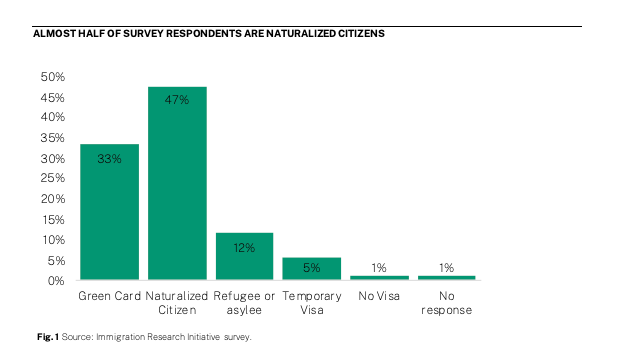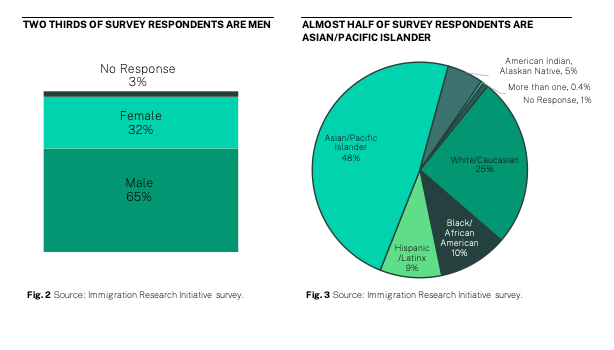“Maybe It Is Because I Was Not Born in the U.S.”: Immigrant Stories of Challenges to Medicaid Enrollment
Enrolling for Medicaid can be an arduous and daunting process for anyone. The technical language, document requirements and substantial amounts of paperwork can create difficulties during enrollment that can deter individuals from applying. The enrollment process is even more challenging for foreign-born individuals who are often less familiar with Medicaid than people who grow up in the United States, may not speak English confidently, often lack access to a computer, and may experience xenophobia or other forms of discrimination when seeking out help with the process.
Immigration Research Initiative (IRI) conducted a survey to better understand what the challenges and barriers for immigrants are during the Medicaid enrollment process, and to collect stories of immigrants’ experiences. This survey builds on a series of one-on-one interviews IRI conducted and published as Immigrants’ Experience with Medicaid Enrollment. The survey helps put those interviews into context, giving us a better understanding of the prevalence of these barriers, enriching the stories with a wider range of experiences of immigrants across the United States, and combining individual stories with statistical analysis.
IRI received 259 survey responses from a diverse group of foreign-born individuals residing in the United States. We were able to reach many immigrants due to the help of partners sharing an informational flyer with their community members and aiding with outreach in other ways. The help of these partners, who work closely with immigrants, was instrumental to our project’s success. It allowed us to gain trust and get responses from people who might be reluctant to talk about their experiences. We reached immigrants with a range of diverse backgrounds– the survey includes a wide range of perspectives, making it varied without being representative of the overall immigrant population (See Methodology).
This survey includes experiences of all people who applied for Medicaid, both those who were accepted and those who were denied. Almost half of the survey respondents (47 percent) are naturalized citizens,12 percent are refugees or asylees, another one third (33 percent) hold green cards but did not report being refugees or asylees, and 5 percent are residing in the United States with a temporary visa. Two percent are likely to be undocumented, having said they have no visa or that they prefer not to answer the question.

Of the 259 respondents, nearly two thirds are men (65 percent) and nearly one third women (32 percent). No respondents chose to report a different gender identity, however, three percent chose not to respond to this question. Almost half (48 percent) of the survey respondents are Asian or Pacific Islander, one quarter (25 percent) are white, 10 percent are Black or African American, followed by 9 percent Hispanic/Latinx and 5 percent are American Indian/Alaskan Native.

Many survey respondents relied on others’ help when enrolling to mitigate the challenges they face.
The survey responses revealed the many administrative and cultural barriers that immigrants face when enrolling for Medicaid that can deter individuals from applying or successfully enrolling These barriers include the use of technical jargon on applications that can be difficult for non-English speakers to understand, language barriers, long wait periods, lack of assistance with the enrollment process, inaccessible Medicaid office locations, and experiences of discrimination from Medicaid personnel.
From our analysis of the survey responses, IRI has a series of recommendations to help make the process easier, which include some of the following:
- Expand support for community-based organizations to help with Medicaid enrollment.
- Increase access to documents in other languages and interpreting services
- Make Medicaid offices easier to find and accessible to public transportation.
- Combat conscious and unconscious bias among Medicaid staff.
- Expand public education and outreach.
- Reduce wait times by hiring more Medicaid staff and making the best use of existing staff.
- Make sure ever applicant is treated with the respect and kindness they deserve.
The findings of our survey responses are summarized in three short reports:
- “You Wouldn’t Believe Me If I Said It Was Because of the Language Barrier”: Administrative and Cultural Obstacles to Medicaid Enrollment
- “I Was Discriminated Against by the Staff”: Experiences of Medicaid Enrollment
- “I Have Never Heard the Word Medicaid”: Recommendations for Improving Enrollment for Immigrants
Many thanks to our national and state partners who helped us with outreach and identifying participants for this survey research, to Tomedes for their translation services and to Mara Youdelman for her feedback.
Note: The survey was conducted in English, Spanish, Mandarin, traditional Chinese and simplified Chinese.